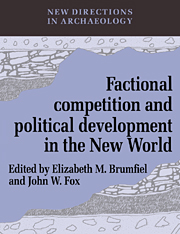Book contents
- Frontmatter
- Contents
- List of figures
- List of tables
- List of contributors
- Preface
- PART I INTRODUCTION
- PART II CHIEFDOMS
- PART III STATES
- 7 Ethnicity and political control in a complex society: the Tarascan state of prehispanic Mexico
- 8 Ethnic groups and political development in ancient Mexico
- 9 Factional divisions within the Aztec (Colhua) royal family
- 10 Alliance and intervention in Aztec imperial expansion
- 11 Political factions in the transition from Classic to Postclassic in the Mixteca Alta
- 12 Internal subdivisions of communities in the prehispanic Valley of Oaxaca
- 13 Cycles of conflict: political factionalism in the Maya Lowlands
- 14 Political cosmology among the Quiché Maya
- 15 Factions and political development in the central Andes
- PART IV DISCUSSIONS
- Bibliography
- Index
11 - Political factions in the transition from Classic to Postclassic in the Mixteca Alta
Published online by Cambridge University Press: 18 December 2009
- Frontmatter
- Contents
- List of figures
- List of tables
- List of contributors
- Preface
- PART I INTRODUCTION
- PART II CHIEFDOMS
- PART III STATES
- 7 Ethnicity and political control in a complex society: the Tarascan state of prehispanic Mexico
- 8 Ethnic groups and political development in ancient Mexico
- 9 Factional divisions within the Aztec (Colhua) royal family
- 10 Alliance and intervention in Aztec imperial expansion
- 11 Political factions in the transition from Classic to Postclassic in the Mixteca Alta
- 12 Internal subdivisions of communities in the prehispanic Valley of Oaxaca
- 13 Cycles of conflict: political factionalism in the Maya Lowlands
- 14 Political cosmology among the Quiché Maya
- 15 Factions and political development in the central Andes
- PART IV DISCUSSIONS
- Bibliography
- Index
Summary
Introduction
Discussion of factional politics often focuses on its divisive and transient nature. Factions are said to appear for the purpose of contesting particular issues (Lewellen 1983:109) and to disintegrate when these issues are resolved. Relative calm then ensues until the next contest when divisive factions will form again.
But factions can produce both conflict and cooperation. A faction is, after all, an alliance forged by individuals to improve their ability to compete (Brumfiel, Chapter 1). Furthermore, factions are not necessarily transient entities; they may occur as stable associations capable of addressing a range of issues. Such were the small, pre-Columbian states of the Terminal Classic through the Late Postclassic in the Mixteca Alta.
Within the Mixteca Alta at the time of conquest, there were many largely autonomous Mixtec “kingdoms” (Dahlgren 1954; Spores 1967; Caso 1977–9; Pohl in press). Some of these polities dominated and influenced each other; for example, powerful Tilantongo dominated the decision making of several other communities. In some ways, these towns were like vassal states, but in other ways they remained autonomous. They had their own hereditary rulers, and they contracted separate alliances (Pohl 1991, in press).
Paradoxically, Tilantongo, the most powerful state in the Mixteca at the time of the Spanish conquest, was a small, architecturally unimpressive site (Caso 1938). How was so much power concentrated in a place which had such a small population and so little substantial public architecture? Tilantongo exercised its power indirectly, through the construction of a regional alliance system that ordered social relations throughout the Mixteca Alta.
- Type
- Chapter
- Information
- Factional Competition and Political Development in the New World , pp. 117 - 126Publisher: Cambridge University PressPrint publication year: 1994
- 2
- Cited by



